Evacuations as Greek ammo dump explodes in fires
A top Greek minister has resigned in disgrace after vacationing during the wildfires that have killed four and burned 50,000 hectares.
World
Don't miss out on the headlines from World. Followed categories will be added to My News.
On Friday, Greece’s minister for citizen protection, Notis Mitarachi, resigned, Prime Minister Kyriakos Mitsotakis’ office announced in a press release.
His resignation was linked to the fact that he has been on vacation in recent days, while the country has been battling wildfires, according to a senior official in the premier’s office.
He will be replaced by Yannis Oikonomou, 49, a former government spokesman.
The move comes a month after the country held general elections and the conservative New Democracy party returned to power.
For more than 10 days, Greece has sweltered under what some experts say is the longest heatwave recorded in July for decades.
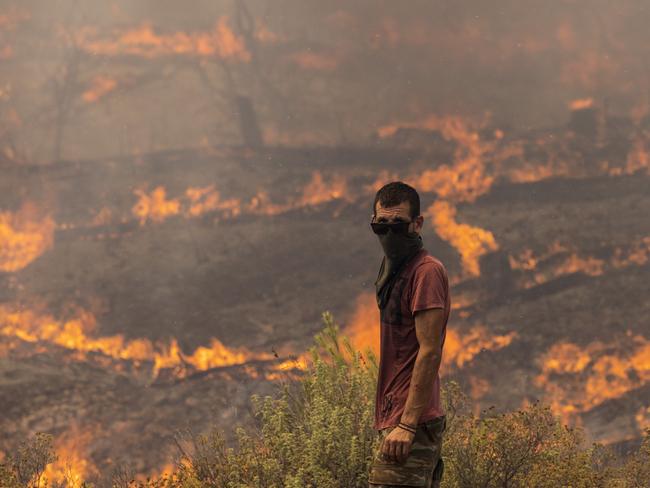
Officials say the fight against the deadly wildfires raging in Greece for more than a week is improving, the fire service said on Friday, warning it remained on alert as fierce winds were forecast that could rekindle blazes.
“For now we have no spreading fires, the situation is improving, but we remain on a war footing to contain the ongoing fires,” a Greek fire service spokeswoman told AFP.
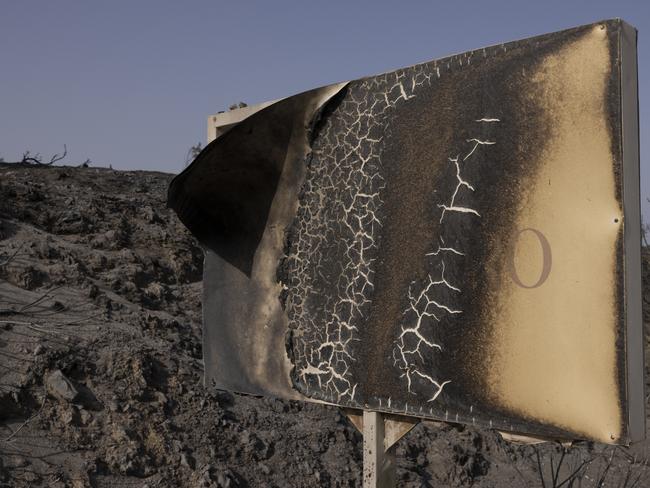
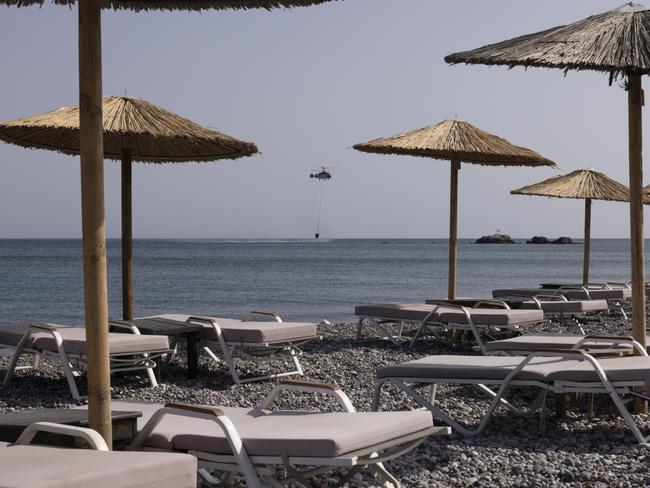
MASS EVACUATIONS AS AMMUNITION WAREHOUSE EXPLODES
Evacuations have been ordered in a community near Volos in central Greece after an explosion in an ammunition warehouse as the country battles wildfires.
“Part of the ammunition warehouse at the air force barracks in Nea Anchialos is on fire and an explosion has taken place,” said Yannis Artopios, adding that seven planes and three helicopters were on site to put out the fires which have been burning since Wednesday.
It comes as Greek fire crews scrambled to douse deadly wildfires raging for two weeks around the country before strong winds forecast for the day rekindled blazes.
Hundreds of firefighters backed by European Union reinforcements were struggling to contain the flames on the islands of Rhodes, Corfu and Evia, in addition to a new front that erupted Wednesday in central Greece.
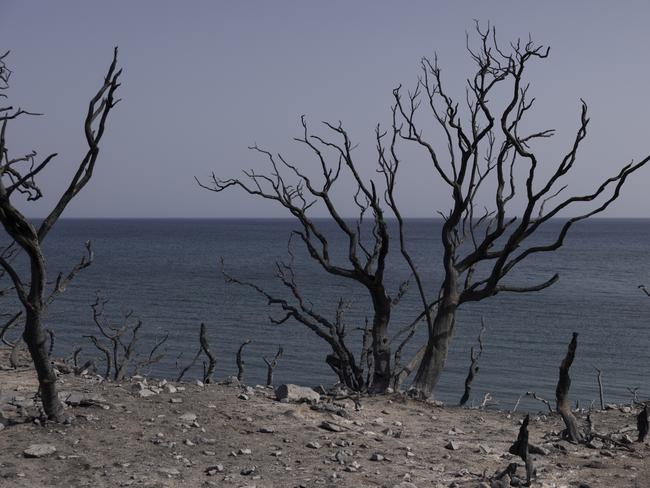
“These are difficult and very sad days,” Prime Minister Kyriakos Mitsotakis said.
Mitsotakis said Greece was “mourning four fellow citizens, the two aircraft pilots... and two who could not distance themselves from the inferno in time.”
Five bodies have been recovered from fire-stricken areas this week, but a police source told AFP that a cattle farmer found burned on the island of Evia on Tuesday had disappeared before the fire and was not listed among the wildfire casualties.
Around the Mediterranean, fires this week also flared in Croatia and Italy, and flames killed 34 in Algeria in extreme heat that has left landscapes tinder dry.
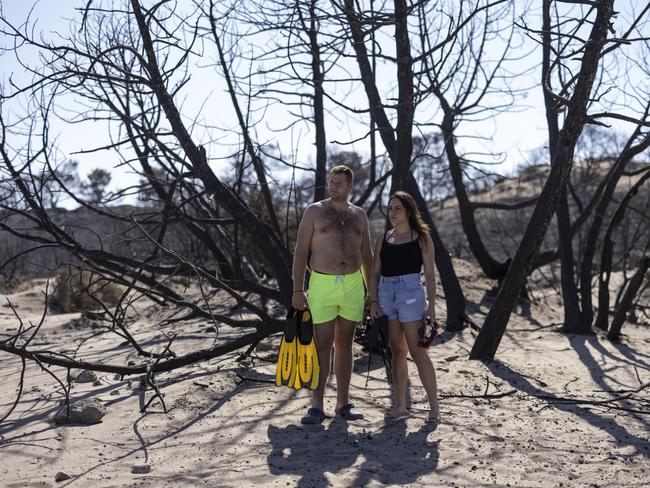
SIX-HUNDRED WILDFIRES, TENS OF THOUSANDS FLEE
Officials have said more than 600 wildfires have broken out around Greece since July 13, with the vast majority tackled before becoming a threat.
The civil protection ministry warned of extreme danger of fire in over a dozen Greek regions Thursday.
A forest fire broke out Wednesday in mountainous terrain near the Greek-Bulgarian border, and was still out of control.
Early Thursday, another fire broke out near homes in the leafy Athens suburb of Kifissia, but was swiftly extinguished.
Tens of thousands of residents and tourists at the height of the busy travel season have been evacuated, including 20,000 people on Rhodes, where officials declared a state of emergency this week.
A dangerous fire broke out Wednesday near the industrial zone of Volos, leaving two dead.
An elderly disabled woman was found dead inside her burned camper van in a coastal area near Volos, and a cattle farmer was killed while trying to rescue his livestock.
The industrial zone was closed Thursday as a precaution. Six communities and villages around the city of nearly 140,000 people were evacuated early in the morning, with more placed on standby.
CRUEL TWIST AS GREEK FIRES CONTINUE
Greek fire crews are still scrambling to put out wildfires that have left five people dead, before strong winds forecast rekindle blazes across the country.
Hundreds of firefighters backed by European Union reinforcements were struggling to contain the flames on the islands of Rhodes, Corfu and Evia on Thursday, in addition to a new front that erupted a day earlier in central Greece.
Early Thursday, another fire broke out near homes in the leafy Athens suburb of Kifissia but was swiftly extinguished.
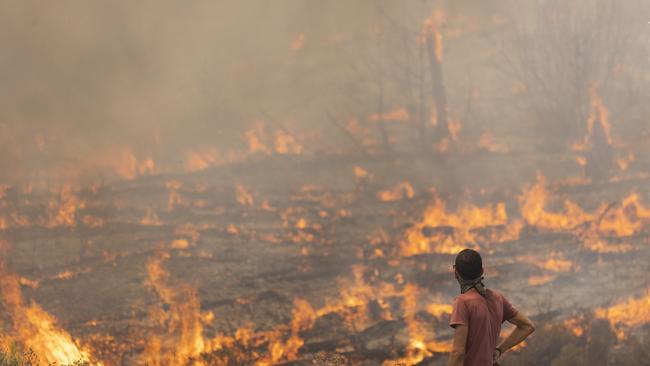
Officials have said more than 600 wildfires have broken out around the country since July 13.
The civil protection ministry has warned of an extreme danger of fire in over a dozen Greek regions on Thursday.
Tens of thousands of residents and tourists at the height of the busy travel season have been evacuated, including 20,000 people on Rhodes.
A dangerous fire broke out Wednesday near the industrial zone of the central city of Volos, leaving two dead.
An elderly disabled woman was found dead inside her burned camper van in a coastal area near Volos and a cattle farmer was killed while trying to rescue his livestock.
The industrial zone was closed Thursday as a precaution. Six communities and villages around the city of nearly 140,000 people were evacuated early in the morning, with more placed on standby.
Temperatures are expected to drop Thursday after a prolonged heatwave but near-gale winds may complicate efforts to douse the fires.
Prime Minister Kyriakos Mitsotakis on Wednesday told the cabinet that the coming days will be “difficult as the heatwave will be followed by strong winds.” “We are living through dangerous summer days, as are nine other Mediterranean countries,” civil protection minister Vassilis Kikilias said in a televised address Wednesday.
“Very high temperatures of over 40 degrees Celsius (104 Fahrenheit) and intense winds have created fire fronts of many kilometres,” Kikilias said, adding that crews were battling through “inconceivable fatigue.” Scientists from the World Weather Attribution group said this week the heatwaves that have hit parts of Europe and North America this month would have been almost impossible without human-caused climate change.
The EU crisis management commissioner’s office on Wednesday said over 490 firefighters and seven planes had been deployed to different areas in Greece under the bloc’s civil protection mechanism.
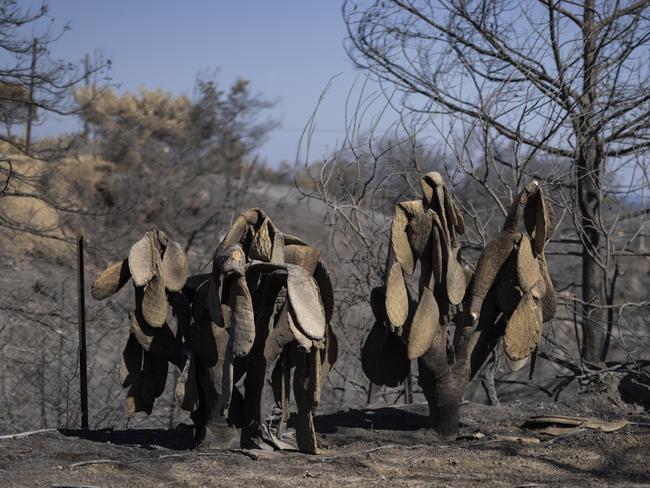
CHAOS AS HEATWAVE, FIRES CONTINUE
Greece ordered more evacuations for areas near two central cities after new blazes broke out during a punishing heatwave and as deadly fires hit the Mediterranean.
Thousands of people have evacuated in the region this week as fires also flared in Croatia and Italy, and flames killed 34 in Algeria in extreme heat that has left landscapes tinder dry.
New blazes threatened central Greece on Wednesday, prompting orders for locals to leave near the industrial centre of Volos and outside Lamia.
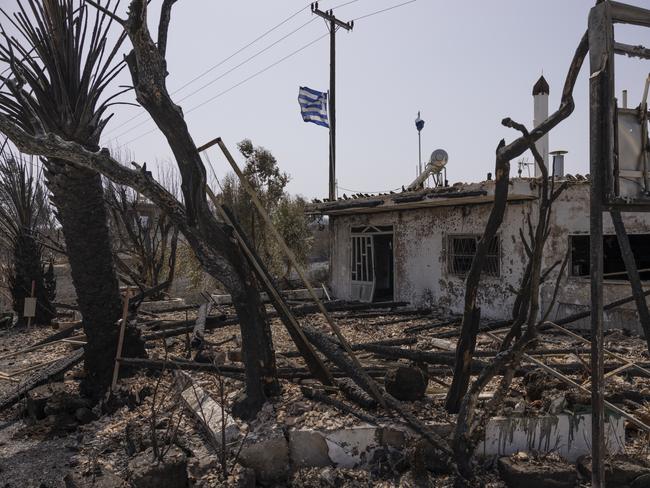
“It’s hell here. There are four different fronts … stretching across a combined 10 kilometres,” Dorothea Kolindrini, a deputy governor from an area included in the orders, told state TV ERT.
Scientists from the World Weather Attribution group said this week the heatwaves that have hit parts of Europe and North America this month would have been almost impossible without human-caused climate change.
The European Union’s climate observatory Copernicus on Wednesday said smoke emissions from wildfires in Greece have been the highest for this period of time in the last 21 years.
Greece has battled over 600 fires in the past 12 days, the government said Wednesday.
Temperatures were expected to hit between 43-46 degrees Celsius in central and southern Greece, according to the national meteorological service.
“Today is the most difficult day in terms of the heat, complicating the fight against existing fires and making new fire outbreaks more likely,” fire department spokesman Ioannis Artopios told Skai radio.
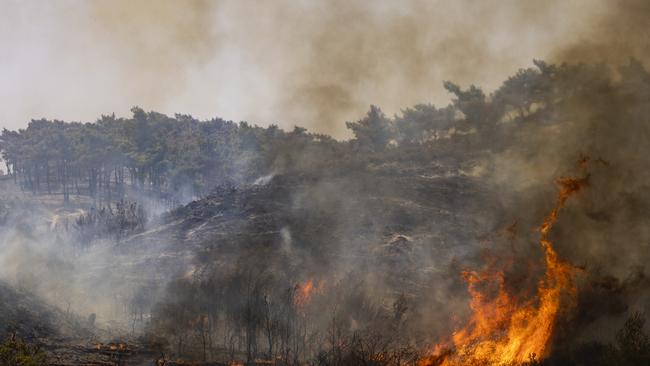
Storms are forecast for Thursday.
Greece is used to summer heatwaves, but is experiencing one of the longest ones in recent years, according to experts.
The civil protection ministry has warned of an extreme danger of fire in six of the country’s 13 regions on Wednesday.
Wildfires, which have been burning in several parts of the country for more than 10 days, were ravaging the tourist islands of Rhodes, Corfu and Evia.
The EU crisis management commissioner’s office on Wednesday said over 490 firefighters and seven planes had been deployed to different areas in Greece under the bloc’s civil protection mechanism.
At least 100 firefighters were working to contain the flames on Evia, where on Tuesday two pilots were killed when their water bomber aircraft crashed.
The body of a third victim was also found on Evia.
Authorities have evacuated tens of thousands of people from fire areas in Greece, including many tourists.
FIRES AROUND THE MEDITERRANEAN
The severe heatwave in Greece has also been reflected across much of southern Europe and northern Africa.
Witnesses described fleeing walls of flames in Algreria that raged “like a blowtorch”, and TV footage showed charred cars, burnt-out shops and smouldering scrubland.
“Back home, there is nothing left and not even a sheep survived,” Taous Timizar, a survivor of the blaze in northeast Algeria, told AFP.
In Italy, firefighters spent the night battling wildfires in Sicily, one of which approached so close to Palermo airport that it shut down for several hours Tuesday morning.
In the north of Italy, a 16-year-old girl on a camping trip was among two people killed by falling trees during violent storms.
Dozens of firefighters were battling a wildfire near Croatia’s picturesque southern city of Dubrovnik, authorities said Wednesday, with waterbombing planes dispatched to help contain the blaze.
Around 130 firefighters were working to contain the flames that had been spread by strong winds on Tuesday.
Local media reported the fire also triggered landmines to explode in the area. During the bloody break-up of Yugoslavia in the 1990s, Dubrovnik was besieged and shelled by Serb forces, leading several areas in the city to be damaged while swathes of its outskirts are still contaminated by landmines.
MOMENT GREEK FIREFIGHTING PLANE CRASHES INTO FIREBALL
Two pilots are dead after their low-flying plane clipped a tree and crashed into a fireball while battling Greece’s forest fires.
A shocking video of the Greek tragedy shows the Canadair plane douse flames on the island of Evia before appearing to collide with branches, bank a sharp right and nose dive behind a ridge.
Seconds later, a fireball of smoke and flame can be seen mushrooming over the ravine on the heights of Karystos, near Platanisto.
The video of the water bombing plane was published by state broadcaster, TV ERT, which quoted the Greek Ministry of Defence as confirming the two pilots on board were from the Greek air force.
“A three-day mourning period is declared in the Armed Forces for the loss of life, in the line of duty, of the Air Force officers and pilots of the firefighting aircraft CL-215, which was operating in Evia,” the Greek defence ministry said in a statement.
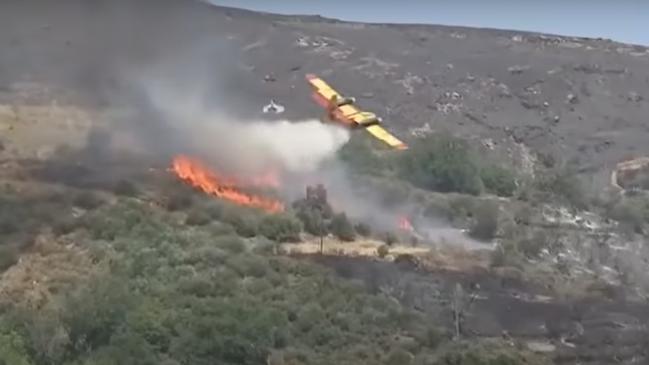
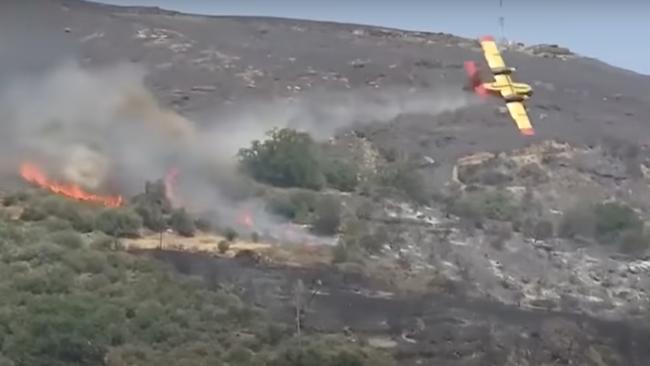
The plane was one of at least three aircraft dispatched to the island of Evia, where Greek civil protection authorities issued an overnight evacuation order in one of its northern localities.
The accident occurred as Greece battled wildfires on three major fronts, including the tourist islands of Rhodes and Corfu, with many of the country’s regions listed at extreme risk of dangerous forest fires exacerbated by strong winds.
It comes after a weekend of intense heat as thousands of locals and tourists fled forest fires on the Greek islands of Rhodes and Corfu, with the prime minister warning the heat-battered nation is “at war” with the flames.
“We have another difficult summer ahead of us,” Prime Minister Kyriakos Mitsotakis told the cabinet.
WWF Greece on Tuesday said 35,000 hectares (86,500 acres) of forest and other land had been scorched by fire in the country just in the past week.
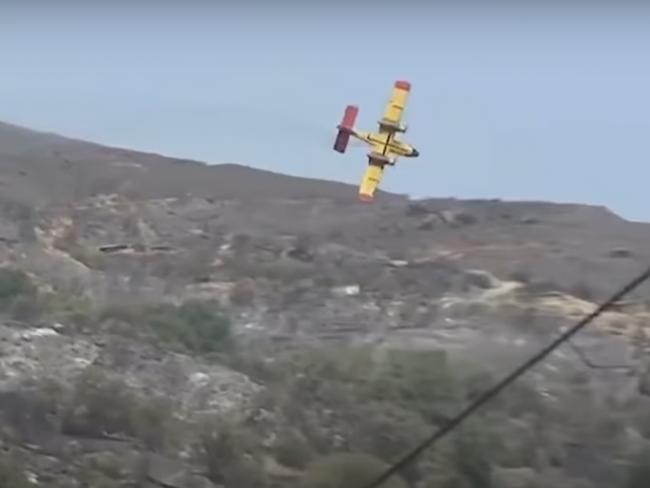
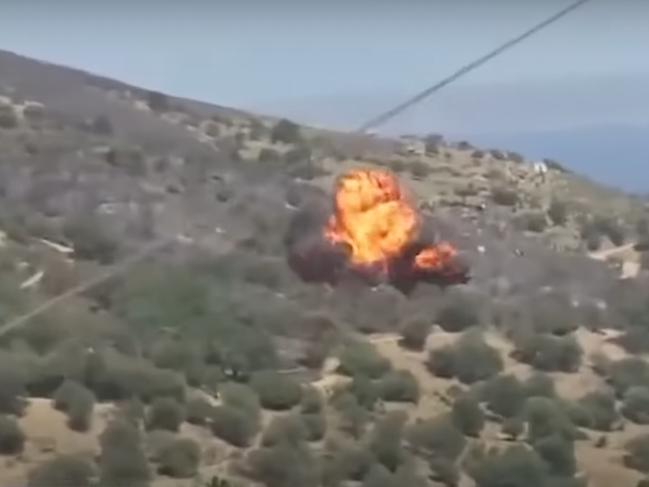
In the capital Athens, the heat is expected to reach 41 degrees Celsius, and hit up to 44C in central Greece, according to the national weather forecaster EMY.
Authorities evacuated nearly 2,500 people from the Greek island of Corfu on Monday, after tens of thousands of people had already fled blazes on the island of Rhodes, with many frightened tourists scrambling to get home on evacuation flights.
More than 260 firefighters were still battling flames for an eighth consecutive day on Rhodes, supported by nine planes and two helicopters.
A source at Rhodes airport operators Fraport on Tuesday said the situation had normalised, with traffic levels consistent with the height of the summer season on one of Greece’s prime travel destinations.
The Greek transport ministry said over 2,100 people had flown home on emergency flights.
Fires were also raging on Greece’s second-largest island of Evia, where Greek civil protection authorities issued an overnight evacuation order in one northern locality.
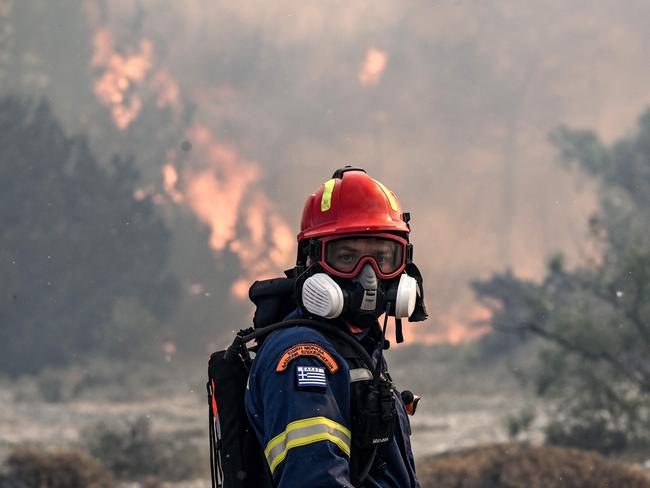
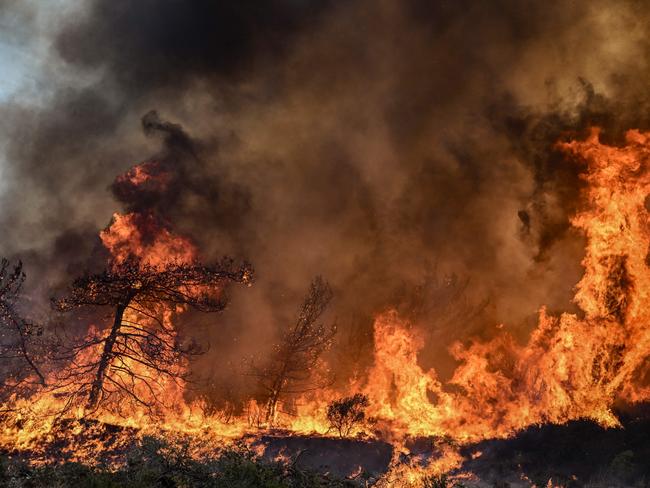
Mitsotakis said Greece’s state apparatuses faced a “major challenge” as the prolonged heatwave and successive wildfires had officials on a 24-hour alert footing for “several weeks.” The mercury hit 46.4C in Gythio, in the southern Peloponnese peninsula on Sunday, though failed to reach the hottest temperature nationally on record of 48C.
Mitsotakis has warned that the country faced “another three difficult days ahead” before high temperatures are forecast to ease from Thursday.
Vassilis Kikilias, Greece’s civil protection minister, said crews had battled over 500 fires around the country for 12 straight days.
The fires are particularly devastating on islands such as Rhodes and Corfu where the tourist season is in full swing and hotels are often full.
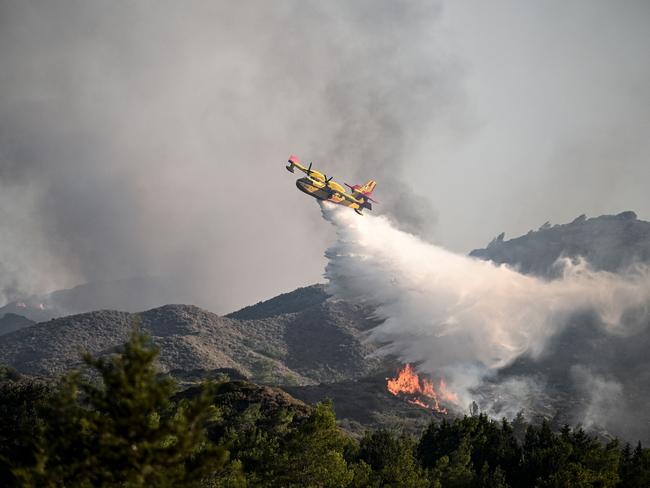
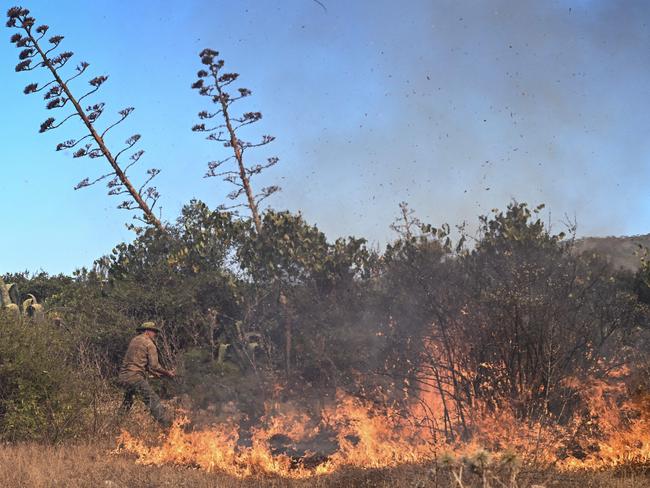
Volunteers had come to the aid of foreign tourists in the north of Rhodes where nearly 200 people are still camped out at a school after being evacuated from the fires on Saturday.
“I can’t believe they are so nice, they gave so much in every way,” said 69-year-old British tourist Christine Moody, who was spending her first vacation in Greece when the fires hit.
“I am very moved,” she said.
In the village of Vati, in the southeast of the island, local mayor Vassilis Kalabodakis said the impact on the region was “tragic”.
“The village has been ordered to evacuate but we can’t abandon it,” he said. “We are leading the fight to protect our home”.
With AFP




